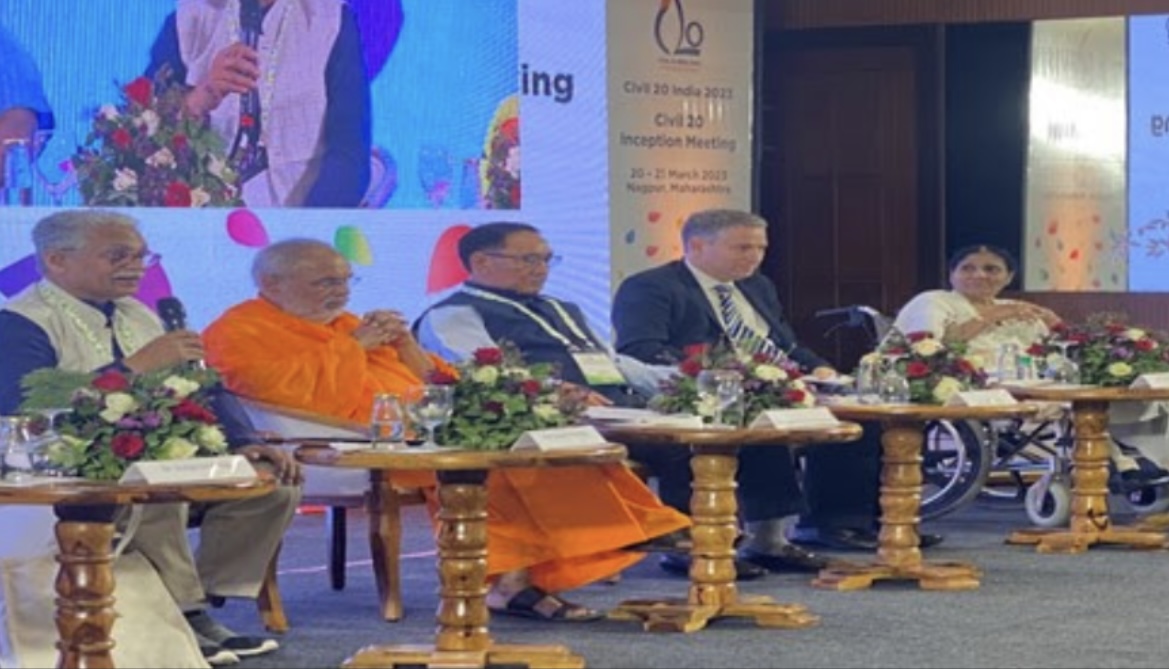The plenary session on Day-2 of CIVIL20 India 2023 Inception Meet at Nagpur today, was on the theme ‘Civil Society Organisations and Promotion of Human Values’. The session covered the following Working Groups of Civil20 India 2023: Sewa – Sense of Service, Philanthropy and Volunteerism; Vasudhaiva Kutumbakam – World is One Family; Diversity, Inclusion, Mutual Respect and Human Rights as Human Value.
The session was chaired by Shyam Parande, Global Coordinator, Sewa International. Shyam Parande said that activists and delegates present in this conference should carry the message of appo deep bhava (be the light yourself) given by Gautam Buddha. He then said that moral values and human ethos are the strength of civil society. India has a long history of values and these Indian value match the global values, he said.
The speakers of this session included Naseema Hurzuk, President Saahas Disability Research and Care Foundation, Kolhapur, Dr Shashi Bala, President, International Council of Cultural Studies, India. Swami Parmatmanada, Arsha Vidya Mandir and Owain James, Global Director, 100 Million Campaign.
The respective coordinators of these Working Group also spoke in the session. They were namely Santosh Gupta, CEO of Indian Social Responsibility Network (ISRN); Dr Vikrant Tomar, Convener of United Consciousness Global; Dr Joram Begi, Chairman of Vivekananda Kendra Institute of Culture (VKIC), Guwahati; and Durganand Jha, Executive Chairman at Centre for Policy Analysis.
Swami Parmatmanada said that everything is given to us and we are not the author of anything. Since everything is given, we must respect the giver. He highlighted the need for respecting the others and conducting our actions in such a way so that we do not trample upon the rights of others.
Santosh Gupta said that when we do Sewa (service) there is a feeling in our soul that we should work for a cause. In the phrase, Sewa Parmodharma, Parmodharma is a mingle of spirituality and devotion. Sewa is better than volunteerism (for a limited time) and Philanthropy (Charity). He also talked of how Sewa was defined in major religions of the world.
Owain James talked of the inequalities prevalent in the world and specifically highlighted the uneven development in Sub-Saharan Africa. There was an increase in number of Sub-Sahara Africans living on less than $2.15 a day since 2015. Number of child labour and children out of school were also increasing in Sub-Saharan Africa. He said that Africa had some of the best natural resources but remained underdeveloped because profits were being moved offshore. He called for justice to Africa’s children.
Vikrant Tomar said that theme of G20 was Vasudhaiva Kutumbkam which meant that every being on this planet was one essential family. We are same human beings but the degree of consciousness varied. He said that we had forgotten the concept of oneness. Human beings were the most intelligent species but also the most unhappy species on the planet. This was because of limited thoughts. The choice today before us was one existence or no-existence, he said.
Naseema Hurzuk talked about Sewa (Service) and Sewa Bhav (Spirit of Service). There are two types of Sewa- a financial sewa and a social sewa. Although a spirit of service is basically present in all human beings but when personal adversity falls, the spirit of service to others is awakened. We get the joy of service when we continue the vow of service without expectations, she said. She remarked: “ The logo of C20 is #You are the Light means that a society runs on its own strength and we make our own day”. The C20 and G20 must focus on development of those who are living a difficult life, she stated.
Dr Shashi Bala said that diversity, inclusion and mutual respect were important part of G20 and C20. She said that happiness should not be confined to enhancing financial and political power but there should be a focus on all-round development giving voice to the marginalised, voiceless and marginalised. Vasudhaiva Kutumbkam entailed diversity without exclusion. The motto You are the light leads to the inclusion of knowledge.
Dr Joram Begi said that diversity is the fundamental law of nature and is unavoidable. The universe is interconnected, interrelated and interdependent and this implied inclusion for all. Taking up the principles of diversity, inclusion and mutual respect were the best mechanism for conflict resolution. He then spoke of how the ancient Indian thought says ‘One manifests in all’.
Durganand Jha said that the UNO should revisit concept of human rights. Apart from a Universal Declaration of Human Rights, there should be a regional declaration of human rights. He said that human rights should not be used as a strategic instrument against any country.
👉 Click here to read the latest Gujarat news on TheLiveAhmedabad.com




